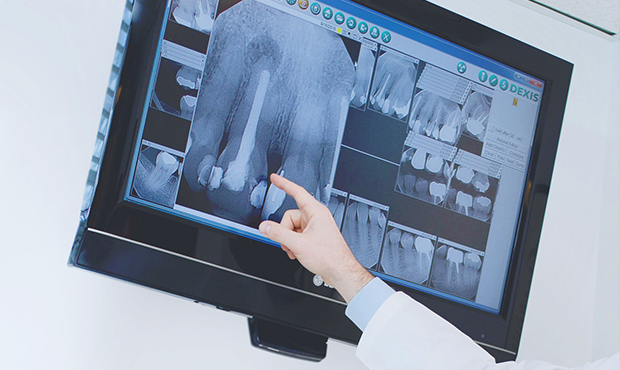Root Canal
Treatment
Modern-day root canal therapy can be an effective way to save a tooth with damaged pulp from removal.
About Root Canal Treatment
Removal used to be the only option when faced with a tooth that had diseased or injured pulp (the living tissue inside the tooth). Now, root canal therapy is the treatment of choice to cure such infections and save the tooth. By preserving the tooth, root canal therapy can prevent problems to adjacent teeth that extraction (tooth pulling) can cause. This will help you better maintain your oral health and avoid potential issues in the future.
Modern root canal therapy, provided by a specially-trained endodontist, can often be performed with little or no discomfort. By removing inflamed or damaged tissue, a root canal procedure can put an end to pain and help prevent serious complications that can develop, such as jaw infections.
During a root canal, the pulp and nerves of the tooth are removed along with bacteria and any decay. The resulting cavity is sealed off with material that prevents bacteria from re-entering the tooth. This procedure is sometimes referred to as a “pulpectomy.”
Root canal therapy is highly successful and usually lasts for the life of the tooth. It is rare, but additional treatment is occasionally necessary.
Indications that root canal therapy may be necessary:
- Severe toothache
- An abscess (or pimple) on the gums
- Sensitivity to hot and cold
- Swelling and/or tenderness

Root canal therapy may be needed if:
- Decay is affecting the tooth’s pulp
- An abscess or infection has developed at the root tip or inside the tooth
- Injury or trauma has caused the pulp to die, risking infection
Skill and technique on the part of the endodontist are critical for comfort during a root canal procedure. At Hingham Dentistry, our doctors are specialists with years of experience performing this procedure. Following treatment, they will provide you with aftercare instructions and any other information you need. Good oral hygiene practices and regular dental visits will aid your recovery and the long-term success of your root canal treatment.
Please contact us at our dental office if you have any questions about root canal therapy or would like to schedule a consultation.





